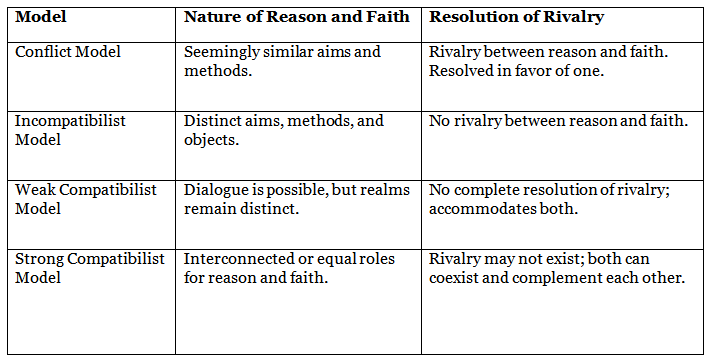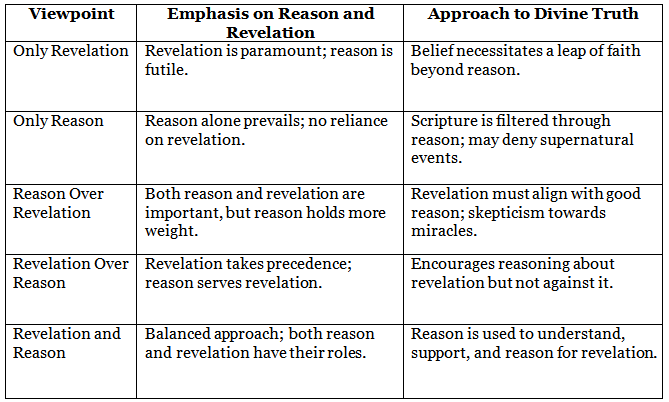UPSC Exam > UPSC Notes > Philosophy Optional for UPSC > Revelation: Unveiling Divine Truth
Revelation: Unveiling Divine Truth | Philosophy Optional for UPSC PDF Download
Definition
- Revelation in religion involves the disclosure of divine or sacred reality to humanity.
- It pertains to the unveiling of hidden or unknown truths through divine communication.
- Revelation is the process by which divine truths are made known to humans.
- Religious knowledge about God, cosmology, the soul, and other supernatural matters is beyond ordinary means of knowing.
- Religious individuals believe that God communicates such knowledge to chosen persons through various means, including mystical insights, historical events, and spiritual experiences.
- Some religious texts, such as the Bible and Upanishads, describe God as a hidden or transcendent entity.
- God cannot be known through ordinary means like perception or inference; revelation is the means to know God.
Modes of Revelation
God reveals divine truths through:
- Mystical experiences.
- Historical events.
- Spiritual experiences.
- Dreams, visions, and signs.
- Special messengers and divine creations.
- Holy scriptures and holy spirit.
- Miracles.
- These revelations occur suddenly and unexpectedly, transforming human spirits.
Varieties of Revelation
Primitive Religions:- Revelation often involves magical divination techniques.
- Revelation is the "Word of God" transmitted to accredited spokesmen.
- Prophets communicate divine messages to entire communities.
- Revelation is an ineffable experience of the transcendent or divine.
- God is a free, personal spirit distinct from the world.
- Revelation is a divine self-disclosure, akin to interpersonal relationships.
Indian Tradition (Hinduism):
Revelation occurs through:
- Nature.
- Scriptures (e.g., Vedas).
- Incarnation.
- Spiritual realization.
- Doctrine of grace and miracles.
- Revelation serves as a foundational source of religious knowledge.
- It is a certain and indubitable form of knowledge for religious individuals.
- Revelation functions as a "pramana" (source of knowledge).
- Revelation profoundly influences the personality of the recipients.
- Revelations received on behalf of the entire faithful community are called "public" revelations.
- Private revelations are intended for the guidance or edification of the recipient alone.
- Eastern religions emphasize the manifestation of the Absolute through the general order of nature.
- Western religions maintain that God has specially revealed Himself to particular peoples.
- Special revelation can occur through:
- Direct inspiration of divinely chosen prophets.
- Witnessing and interpreting God's actions in history.
- Deeds superseding words in importance.
- Sacred books play a pivotal role in preserving and transmitting revelation.
- Different religions have varying views on the inspiration and inerrancy of their sacred texts.
- Many religions distinguish between constitutive revelation ("Shruti") and traditional writings ("Smriti").
- Revelation is often complemented by authoritative commentaries and traditions.
- Nonverbal communication, art, sacred music, liturgy, and drama aid the transmission of revelation.
- Gurus, monks, or holy individuals guide seekers through initiation.
- Preparation through prayer and asceticism is crucial.
- Revelations often transcend the limitations of words and rationality.
- Some mysticism aims at absorption into the divine, involving the loss of individual consciousness.
- Others affirm the distinctness of the individual personality.
- Islamic orthodoxy emphasizes communion with God and submission.
- Islamic Sufism seeks personal union with God.
- Revelation transcends ordinary rational thought.
- Some religions, like Buddhism, allow limited criticism based on reason.
- However, revelation often involves acceptance beyond reason.
- Western religions grapple with the tension between revelation and reason.
- Some take a "fideist" position, prioritizing faith over reason.
- Others reinterpret revelation to align with science and philosophy.
- Intellectualist positions aim to reconcile faith with reason but may oversimplify faith's transcendence.
- Revelation is essential for dialogue among diverse religions.
- Faith is the human receptivity to revelation, making them interdependent.
- Faith is central to religion, just as reason is to philosophy.
- Faith is necessary and sufficient for religious belief, accepted even without evidence.
- According to Kant, faith has subjective certainty for action but lacks objective knowledge.
Types and Variations of Revelation
I. Primitive/Tribal Religions:
- Revelation is often associated with supernatural power related to physical objects like stones, amulets, and sacred animals.
- Sacredness is also found in nature, including trees, groves, and elemental elements.
- Objects take on symbolic value and mediate spiritual experiences.
- Shamans act as intermediaries, akin to prophets and mystics.
- Eastern religions focus on understanding existence and achieving enlightenment and unity with the Absolute.
- Revelation in the sense of divine self-communication is more explicit in Western religions.
- Revelation involves seekers tapping into their spiritual powers to transcend worldly illusion.
- Sacred texts embody revelation by reflecting eternal truths.
- Vedanta includes monistic and theistic tendencies.
- Revelation in Buddhism is not a personal intervention but enlightenment through discipline and meditation.
- Gautama the Buddha gained enlightenment through ascetical contemplation.
- While Buddhists don't speak of supernatural revelation, they regard the Buddha as a discoverer of liberating truth.
- In Judaism, Christianity, and Islam, revelation is fundamental to religious knowledge.
- God revealed Himself to patriarchs and prophets through theophanies, dreams, visions, and more.
- Moses and the prophets interpreted God's will.
- Their words were accepted as the Word of God in loving obedience.
- Christianity views Jesus Christ as the unsurpassable climax of revelation, being God's Son and the perfect image of the Father.
- Revelation occurs in the life, teaching, death, and Resurrection of Jesus, as interpreted by apostolic witnesses.
- Islam's basis is in revelations received by Muhammad.
- These revelations were compiled into the Qur'an, the final and perfect revelation.
- Islam regards the Qur'an as a correction and completion of previous revelations.
- Zoroastrianism received revelation from Ahura Mazda, enabling understanding of good (Truth) and evil (The Lie) and knowledge of the one true God.
- Revelation may have no meaning for those without faith in God or the supernatural.
- The source of knowledge (God) is debatable.
- Revelation is unverifiable, making it difficult to judge its certainty.
- There is significant variation and contradiction among scriptures, even within the same religion.
- Reason plays a limited role in matters of revelation.
Interplay Between Faith and Reason
Faith and reason are two distinct sources of authority that underpin beliefs. Reason encompasses principles for intellectual, moral, aesthetic, and religious inquiries, going beyond mere logical inference. It often presupposes algorithmic demonstrability, justifying propositions as true or authoritative after demonstration.
On the other hand, faith pertains to an attitude of trust or assent towards claims that may not be currently demonstrable by reason. Religious faith frequently refers to a transcendent source and is rooted in the authority of revelation, often involving an act of will or commitment by the believer.
The central philosophical question is how faith and reason's authorities interact to justify or establish religious beliefs as true or valid. Four fundamental models of interaction emerge:1. Conflict Model:
- In this model, reason and faith appear to share similar aims, objects, or methods. When they yield different conclusions, genuine rivalry arises.
- It is embraced by both religious fundamentalists, who prioritize faith, and scientific naturalists, who favor reason.
- Here, reason and faith are understood to have distinct aims, objects, and methods, allowing for their compartmentalization.
- Reason seeks empirical truth, while religion pursues divine truths. Thus, they do not compete with each other.
- This model can be further subdivided:
- Some assert faith is transrational, superior to reason, suggesting that reason can only reconstruct what is implicit in faith.
- Others claim that religious belief is irrational and cannot be subject to rational evaluation, as seen in negative theology.
- These ideas can lead to fideism, emphasizing faith's resistance to rational elucidation or justification.
- Dialogue between reason and faith is possible in this model, yet both maintain separate realms of evaluation and cogency.
- For instance, faith may involve miracles, while reason engages scientific methods like hypothesis testing.
- This model aligns with much of the Reformed model of Christianity.
- In this view, faith and reason are interconnected, possibly even equal. A well-known form is natural theology.
- Articles of faith can be demonstrated by reason, either deductively (from widely accepted theological premises) or inductively (from common experiences).
- There are two variations:
- The first starts with justified scientific claims and supplements them with theological claims beyond science.
- The second initiates with theological claims and refines them using scientific thinking.
Difference Table: Conflict vs. Incompatibilist vs. Weak Compatibilist vs. Strong Compatibilist Models 
Understanding the Relationship Between Reason and Revelation
The interplay between reason and revelation has been a topic of philosophical and theological discussion throughout history. Various perspectives have emerged to explain the dynamic between human reasoning and divine revelation. Here, we explore five different viewpoints on the relationship between reason and revelation.1. Only Revelation:
- Championed by Soren Kierkegaard, this perspective posits that due to humanity's fallen nature and separation from God, understanding divine truth is impossible without revelation.
- God is transcendent, making His ways and thoughts beyond human comprehension. Human reasoning cannot grasp the truth of God.
- In this view, reason can only reject the irrational but cannot positively contribute to the discovery of divine truth. Kierkegaard suggests that a "leap of faith" beyond rationality is necessary for belief in divine revelation.
- Advocated by philosophers like Immanuel Kant, this viewpoint asserts that all knowledge is derived from human reason, and nothing is known through divine revelation.
- Kant emphasizes the need to filter Scripture through reason and may result in the denial of supernatural events like miracles, resurrection, etc.
- While this approach underscores the importance of human reason, it neglects the limitations of unaided human reasoning in discovering divine truths.
- This perspective acknowledges the significance of both reason and revelation in a believer's life but grants more weight to reason.
- Exemplified by Deists from the seventeenth and eighteenth centuries, it suggests that if the Bible's teachings do not align with good reason, they should be rejected.
- It necessitates examining revelation through human reason for understanding, application, and comprehension, potentially leading to skepticism about miraculous events and divine truths.
- This view emphasizes the primacy of revelation over reason. Reasoning about revelation is acceptable, but reasoning against it is discouraged.
- Tertullian's idea of "reason within the limits of revelation" and Cornelius Van Til's assertion that reason depends on revelation exemplify this perspective.
- It recognizes that revelation takes precedence ontologically and positions reason as a servant to God. However, it might downplay the role of human reason and its relationship with divine revelation.
- This perspective, upheld by Augustine and Thomas Aquinas, proposes a balanced approach, asserting that one can reason for revelation but not against it.
- Augustine argued that faith is a step towards understanding, and a partial understanding is necessary for belief. Believers accept, by faith, that which can be proved by reason and that which cannot.
- Thomas Aquinas acknowledged the limitations of human rationality due to total depravity but affirmed that reason persists and supports faith.
Difference Table: Only Revelation vs. Only Reason vs. Reason Over Revelation vs. Revelation Over Reason vs. Revelation and Reason

In summary, the relationship between reason and revelation varies among different philosophical and theological viewpoints. Some prioritize one over the other, while others seek a harmonious balance between the two in the pursuit of divine truth and understanding.
The document Revelation: Unveiling Divine Truth | Philosophy Optional for UPSC is a part of the UPSC Course Philosophy Optional for UPSC.
All you need of UPSC at this link: UPSC
|
60 videos|168 docs
|
Related Searches
















